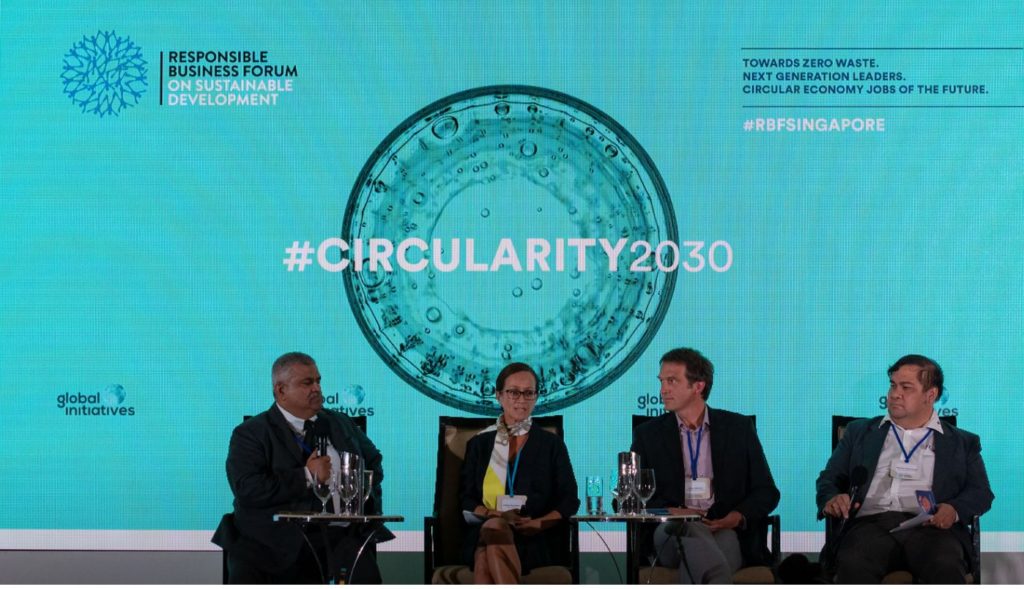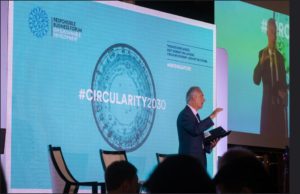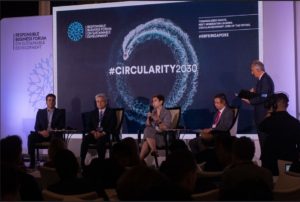Responsible Business Forum 2019
 Green In Future was one of the invited media for this year’s Responsible Business Forum hosted by Global Initiatives on 18 – 19 November at ST Regis, Singapore. The Forum aimed for #Circularity2030, where companies should focus on accelerating the global circular economy and strengthening partnerships to create more circular innovations, thus eliminating waste.
Green In Future was one of the invited media for this year’s Responsible Business Forum hosted by Global Initiatives on 18 – 19 November at ST Regis, Singapore. The Forum aimed for #Circularity2030, where companies should focus on accelerating the global circular economy and strengthening partnerships to create more circular innovations, thus eliminating waste.
Aside from highlighting the importance of reimagining initiatives towards a more sustainable future, #Circularity2030 also set out as a platform for businesses to discuss ways to unlock the circular advantage.
While there are many opportunities for sustainable development, we have to realise some challenges that may come as well should businesses are not adapting to the needs quickly.
“I am glad that platforms such as the Responsible Business Forum are bringing like-minded individuals together to create conversations on circular economy solutions”, said Senior Minister of State for the Environment and Water Resources Dr Amy Khor, in her opening speech.
She also emphasised the significance of the circular economy approach as it “will not only reduce our carbon footprint and benefit the environment. New opportunities for our companies and good jobs will be created if we scale up the extraction of resources from waste and generate economic value from something that would have been thrown away.”
Satya Tripathi, the UN Assistant Secretary-General also stressed the need for us to move towards circular food system, designed out of waste, to make headway for zero hunger.
On the second day of the Forum, Chairman of the People’s Committee of Phú Quốc Island District, Vietnam, Mai Văn Huỳnh; advisor to mayor of Patong Municipality, Thailand, Kumnung Sing-Eaim; and Mayor of Donsol, Philippines, Josephine Alcantara, all signed the Declaration of Intent into WWF’s Plastic Smart Cities programme on behalf of their cities.
Plastic Smart Cities is an initiative by WWF to fight plastic pollution. Through the Initiative, the organisation hopes to empower cities to accelerate efforts in eliminating plastic pollution by 2030. It has also prepared an online knowledge platform with best practices which will be launched at the World Urban Forum in February 2020.
In light of this, WWF encouraged Asian cities to partake and contribute some of their best practices in combating plastic pollution and waste management through its site, www.plasticsmartcities.org. Leaders also requests for governments in the region to take a more proactive action by introducing a global, legally-binding agreements to limit plastics polluting our oceans.
At the Forum, Vincent Kneefel, Global Cities Lead for WWF commented that “with eight million metric tons of plastic entering our oceans each year, mismanaged plastic waste is profoundly threatening people and the environment, especially rivers and oceans.”
“Plastic Smart Cities will strengthen action when it comes to preventing, measuring, and managing plastic waste at a local level. With strong commitments from cities, governments and industry, we can end additional plastics in nature and ensure the safety of our communities and the environment.”
With the focus on eliminating plastic and waste pollutions, The Plastic Data Challenge was officially set in motion on the second day of the Forum as well, supported by The Circulative Initiative and Second Muse of The Incubation Network. Through sourcing and supporting breakthrough technologies, methodologies and working prototypes, this global innovation challenge is intended to help enterpreneurs and businesses address the excessive emit of plastic waste into the environment. On top of that, the challenge also aims to find solutions that tackle the lack of data across Asia’s plastics value chains with a focus on South and Southeast Asia.







